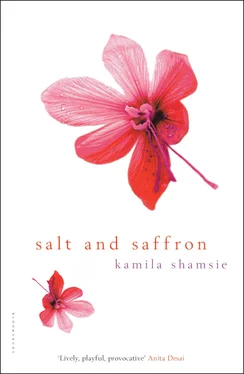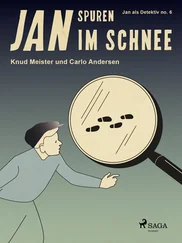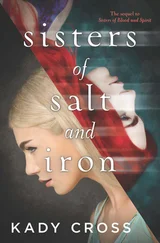‘Why is he being so silly, Apa? I drove the mali to the bus stop last week.’ Then I thought of adding, Besides, Masood’s virtually family, but stopped myself. No, I knew that wasn’t quite true, but why did he have to go and act as though he and I were servant and mistress, rather than …
Rather than what? Mariam Apa’s raised eyebrows asked me.
Rather than two people who often ate dinner together when my parents and Mariam Apa were out for the evening, particularly on cool evenings, when it was a pleasure to be outside the kitchen door, cross-legged under the stars.
Mariam Apa enacted dialling a phone number.
Yes, it had been a while since the news that my family was going out for the evening hadn’t prompted me to pick up the phone and call Sameer or one of my school friends to make dinner plans. But I didn’t appreciate Mariam pointing that out to me.
Four years later I allowed myself to consider the possibility that I was entirely peripheral to that night’s story. Let’s suppose — as suppositions go this is none too farfetched — that Masood heard of his father’s death that night, and not the morning after. Evidence? He burnt the naans. Masood never burnt anything. So let’s suppose he heard of his father’s death — it was the night of a dinner, everyone was congregated in the drawing room, out of earshot of the phone — everyone except for Masood. So the phone in the kitchen rang, and Masood answered, and minutes later Mariam walked into the kitchen. I’m not making this last part up. She was in the kitchen, I know, because she’s the one who told me the naans were burnt. I was walking to my room, was in between the drawing room and my room, when Mariam came out of the kitchen. If only I could remember, but I can’t, if something prompted me to ask, ‘What’s wrong?’ or if she just held out a burnt bit of naan to me.
Mariam loved Masood and Masood loved Mariam and Masood loved his father and his father died and Masood hung up the phone and Mariam walked into the kitchen and the house was full of people and Mariam knew that among those people were people who might walk into the kitchen, maybe to see what Masood was cooking, maybe to see where Mariam had gone, maybe to ask for more ice. And Masood knew that all he wanted right then was to weep in Mariam’s arms.
Is that when the naans burnt? Or was that later, seconds later, when Mariam finally put a hand on his arm, but kept her face turned slightly towards the door, alert for footsteps, and Masood said, ‘This can’t go on. I’ll go mad. We’ll both go mad.’
I can’t fault Mariam for listening for all those footsteps, all those footsteps including mine. But there was a time when I thought that if Masood meant something to me I would fault her for what she did to him all those years. But, really, what did she do except love him, and love us also? Did I fault him? Yes, for months. Yes, for everything. Until one day I was able to say to myself, What did he do except love her and love her?
Sameer brushed a crumb off my cheek. ‘You know you’ll never see her again.’
I stood up and walked over to the glass doors which led out to the garden. Pushed aside the curtains and pressed my head against the glass. The chairs on the terrace were covered in dust.
Karachi was full of corners, and I had grown up turning every corner with the hope in my heart that she would be there. How could I continue to live my life between such corners? How could I not?
Other people never reminded me of Mariam, but that’s not to say I was never reminded of her. In moments when I least expected it everyday objects would become doorways to memory. A shoe buckle, a keyring, a mango seed bleached by the sun; running water, railway tracks, cobblestones and cochineal; cacti, cat’s-eyes, Cocteau and kites; chipped plates, race tracks, swimming pools, diving boards, bluebottles, jellyfish, bougainvillea, stones; crickets and bats and cricket bats.
I know. Cocteau is not an everyday object, but she loved Orphée.
What if she were dead? How would I know? Is it better this way, this not knowing? I wondered, tracing circles in the glass. This way she can be immortal to me, in my lifetime. I don’t ever have to face the finality of her death. That thought should have brought me comfort, but it didn’t. If she were dead, I’d want to know so that I could weep. The circles in the glass looped outward and became spirals. I am frozen when I think of you, Mariam. My mind goes everywhere and nowhere. Nothing in my life is untouched by your absence. I think you’d like Khaleel. I don’t know if that makes me run towards him or pull away.
‘Aliya, what did your father mean that day over lunch? Remember, just after you got back? I escorted Abida Nani out and when I came back he was saying, “I should have fired Masood when …” and then your mother told him to shut up.’
‘I don’t know.’ I had forgotten about that entirely.
Sameer stood up. ‘I’m going to find your mother. Maybe she’ll tell us. You can use my absence to read that e-mail which you’re so desperate for me not to see.’
He left, and I turned gratefully to my laptop.
Hi, Ailment.
Your e-mail about tea at the Starcheds’ had me in hysterics! Seriously. Someone rang the bell and I couldn’t answer it because I was having such a haal picturing Older Starch stuffing food into the older Ali Shah’s mouth to stop him from charming you. But obviously you don’t want to hear any of this, as your last message so subtly hinted. ‘How’s Baji? Have you seen her recently?’ my foot. Why don’t you just come right out and say Cal Butt has hoovered you off your ankles? So, everyone loves him, if that’s what you want to know, but, after he left, Baji (who somehow detected your interest in him, although neither Rehana Apa nor I can recall saying anything about it) said, ‘Of course, you don’t marry an individual. You marry a family.’ Normally I would roll my eyes at this marriage phoo-pha; I mean, flings can be great fun, and if it wasn’t for you I’d fling him in a second. But you’ve never shown signs of being able to do that one-day-at-a-time thing and frankly Liaquatabad should stop you from thinking long-term. I’ve gathered enough info from him to know that his Karachi relatives’ English is weak, they’ve never left the country, and they believe in the joint-family system (the horror, the horror; imagine living in a house teeming with your own relatives, never mind someone else’s). I know he lives in America (claims he wants to get a job that’ll let him travel the globe), but if you and he end up together there’ll have to be family interaction in Karachi and that will be a disaster, the fallout from which will not leave you unscathed at all! Call me a snob if you want to, but what the hell do any one of us have to say to the great mass of our compatriots? We can talk about cricket and complain about the politicians, but then what? I’m not denying that they could be wonderful people, but that’s really not the point.
There — I’ve done my bit. Now I’m going to give you a message from him, which he wrote on my arm in some bloody indelible ink which refused to come off until half a bar of soap later. He wrote: ‘Footfalls echo in the memory/Down the passage which we did not take/Towards the door we never opened/Into the rose garden. My words echo/Thus, in your mind.’
It’s all a bit too pseudo for me, but I suppose you think it’s charming. (Quoting Yeats is charming, Aliya; quoting Eliot is showing off.) He’s still not sure when he’ll be in Karachi, but he will be there before the summer is through. I’ve had to thoroughly wrestle with my conscience about relaying his message to you, but Rehana Apa said she’d tie me to Nelson’s column and feed prunes and bran fibre to the pigeons if I didn’t do it and pronto. Now, don’t expect another message from me for a while. This is all too exhausting and I have to read too many books on fiscal policies of Indian rulers in the eighteenth century.
Читать дальше












